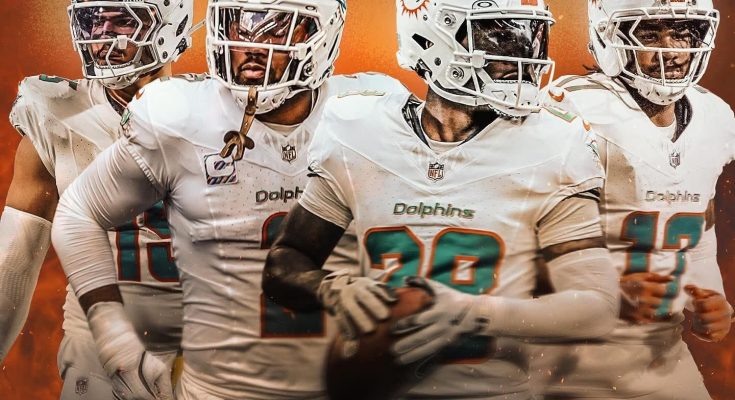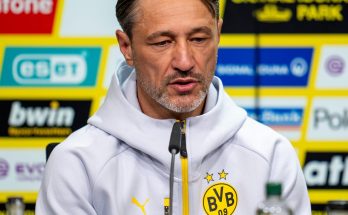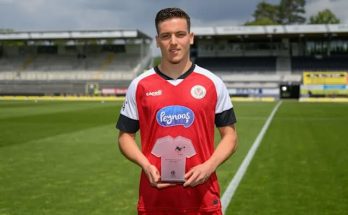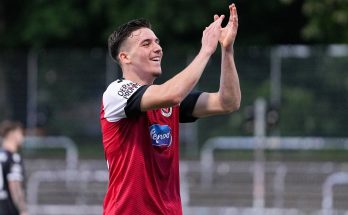The Miami Dolphins are in freefall. Sitting at 1–5 and with little reason to believe that a turnaround is coming, the organization is facing the kind of existential reckoning that tends to define an era. What was supposed to be a contending season has spiraled into disarray, and with the NFL trade deadline approaching on November 4th, rival teams are circling. Names like Jaylen Waddle, De’Von Achane, Bradley Chubb, and Jaelan Phillips are surfacing in trade discussions, and while not all of them are equally likely to be moved, the mere fact that these core players are being talked about tells you everything you need to know about where this franchise stands.
The Dolphins have been an intriguing case over the last few seasons, blending explosive offensive firepower with enough defensive firepower to be considered dangerous in the AFC. But nothing has materialized when it’s mattered most. Whether it was injuries, inconsistency, or schematic breakdowns, Miami has failed to cross the threshold into legitimate contention. Now, with head coach Mike McDaniel’s job in real jeopardy and the roster already bruised and battered, league executives believe a fire sale is at least being considered.
According to ESPN’s Jeremy Fowler, teams believe the Dolphins could make several high-profile players available in the coming weeks. The edge rusher duo of Chubb and Phillips is drawing the most attention, in part due to positional value and in part due to their individual contract situations. Chubb is signed through 2027, but most of the guaranteed money is already paid out, which makes his deal much more tradable. Phillips, meanwhile, is on his fifth-year option, meaning he’ll be a free agent after the season unless Miami extends him or applies the franchise tag. In a season that’s rapidly unraveling, it would make sense for the Dolphins to cash in now if they don’t see him as part of their long-term vision. They could receive meaningful draft capital for him from a team that wants to get ahead of the free-agent market.
Chubb’s situation is a bit different. The Dolphins traded for him in 2022, hoping to anchor their defense with a reliable pass-rusher. But injuries have repeatedly sidelined him, and even when healthy, his production has been uneven. However, he still carries a reputation as a talented, high-upside player at a premium position, which is why multiple playoff-hopeful teams are expected to call about him. The likelihood of him being traded is high compared to some of Miami’s other core players, and with the Dolphins lacking depth and young talent on defense, flipping Chubb for draft assets or a young player could be an appealing move for a front office looking to reset.
Phillips may actually be more valuable in terms of return. While he’s dealt with injuries, including a torn Achilles that cut short his 2024 season, when he’s been on the field, he’s shown flashes of being an elite pass rusher. He’s younger, cheaper, and has more theoretical upside than Chubb, and teams might be willing to overlook the injury history in exchange for that potential. The big question for any acquiring team is whether they can afford to sign him long-term. Because he’s on the last year of his rookie deal, a trade would most likely be made with the intention of working out a contract extension. That creates some risk, but in a league where pass rushers are hard to find, it’s the kind of bet that contenders make.
While Chubb and Phillips seem like logical trade pieces, especially given the Dolphins’ cap situation and future uncertainty, it’s the inclusion of Jaylen Waddle and De’Von Achane in rumors that has raised eyebrows across the league. Both players are under team control. Waddle recently signed an extension through 2028, and Achane is still on a rookie contract. These are the kinds of players you typically keep around during a rebuild, not shop. Yet, the chatter has begun. Fowler’s reporting suggests that rival teams will at least check in on Waddle and Achane, even if the chances of them being dealt are lower than the defenders.
Waddle, in particular, is a fascinating case. He’s been incredibly productive since being drafted in the first round in 2021, forming a lethal duo with Tyreek Hill in one of the NFL’s most dynamic passing attacks. With Hill now out for the season and potentially nearing the end of his prime, Waddle becomes even more important as a foundational piece. But Miami might be thinking differently. If they feel like they can’t win with this core and are looking to create long-term cap space and accumulate picks, then trading Waddle—while painful—might be on the table if a team offers a strong enough return. The Dolphins would need to be blown away, likely requiring a first-round pick and additional compensation to even entertain the idea, but if a team with cap flexibility and a desperate need at receiver comes calling, the Dolphins may be tempted.
Achane is even harder to read. He’s one of the most explosive running backs in the NFL, capable of scoring from anywhere on the field, and he’s dirt cheap for at least the next two seasons. Trading him would make little sense unless Miami had serious doubts about his durability or saw an opportunity to sell high and maximize his value before the shine wears off. Achane’s name appearing in any rumors at all suggests the Dolphins are, at minimum, evaluating every option on the table. No one is being declared untouchable.
In all of this, the looming uncertainty around Mike McDaniel cannot be ignored. If ownership decides to clean house at the end of the year, that will influence the direction the front office takes in the next few weeks. A coach on the hot seat may want to win now, while a front office looking ahead to 2026 may prefer to acquire assets and shed veteran contracts. The dysfunction behind the scenes—be it philosophical disagreements or differences in timeline—could dictate who stays and who goes. If McDaniel is fired after the season, a new coach may want to build the team in a new image, and in that case, even big-name stars could be moved to accelerate a retooling process.
There are risks to trading any of these players. For one, it signals to the locker room that the season is over. That can have consequences on team culture, effort, and fan perception. It could also backfire from a football standpoint—moving young talent like Waddle or Achane could leave the team with fewer offensive weapons to support a future quarterback, whether that’s Tua Tagovailoa or someone else. On the defensive side, shipping out both Chubb and Phillips would leave the Dolphins painfully thin at edge rusher, a position that’s not easy to refill on the fly. But that’s the price of reorienting an organization.
There’s also the issue of market timing. Making trades too early can limit leverage, but waiting too long risks injury or diminishing returns. The Dolphins may want to act before Week 8 to give acquiring teams more time to integrate new players. That would also give Miami the chance to evaluate any new assets this season. Depending on the offers they get, the Dolphins could stagger the trades—perhaps dealing Chubb early, then holding Phillips until closer to the deadline. Or, if they get what they want, they could make multiple moves in one sweep, fully committing to the reset.
Contending teams are already lining up. The 49ers, Eagles, Ravens, Lions, and others could all use defensive help, and Chubb or Phillips would fit nicely into their rotations. On offense, teams like the Texans or Chiefs might inquire about Waddle, while a creative play-caller could find a way to maximize Achane’s unique speed and vision. Every contender in need of an edge will be watching Miami closely over the next two weeks.
Ultimately, this is about control. The Dolphins can either continue to drift, hoping for a miracle turnaround, or they can accept that their window closed before it ever truly opened and begin the hard work of building a sustainable foundation. That means tough decisions. That means admitting some mistakes. And that means trading away players you love watching on Sundays. It’s not ideal. But if done correctly, a retool now could set the franchise up for long-term success. The key is being disciplined—don’t panic sell, don’t give away value just for the sake of making headlines, and don’t lose sight of which players are cornerstones versus replaceable.
As the deadline nears, don’t be surprised if Miami makes a move or two to test the market. Chubb is the most likely to go. Phillips is a close second. Waddle and Achane may stay put, but if the offers come—and they will—Miami will have to at least listen. After all, teams don’t float names like that for no reason. They float them because they’re ready to think bigger. Or start over.



